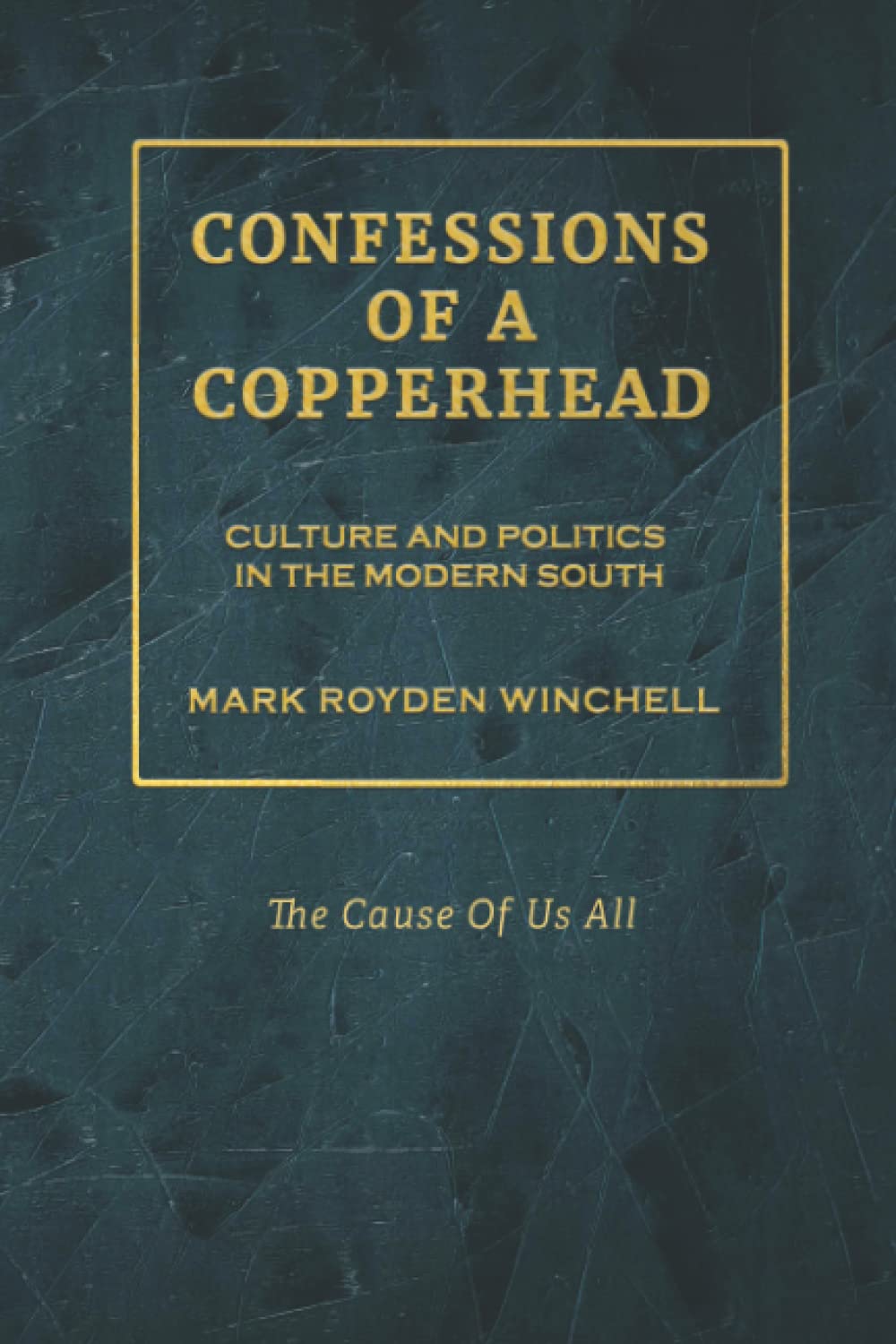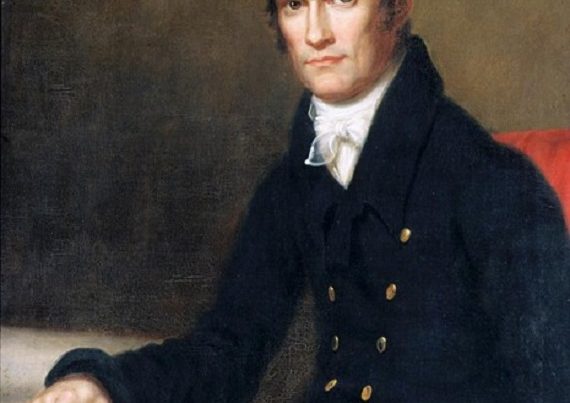A review of Confessions of a Copperhead: Culture and Politics in the Modern South (Shotwell Press, 2022) by Mark Royden Winchell
The concept of the South as a peculiar and singular region of America, indeed not quite American except in its vices of racism and violence, is something of an industry in the halls of academia. Numerous university centers and institutes for Southern studies assure us that this is so. Outside of the intelligentsia, this is not the common view. Everyday people from every region of the country feel a strong affinity for the South, her people, and her culture. This has been true for a long time and not infrequently those who sympathize with the South are subjected to scorn and persecution. During the Civil War, such people were castigated as “copperheads,” treacherous snakes hidden in the grass striking at the heels of the righteous saviors of the Union. The existence of Copperheads, then and now, is troubling to the governing class and their lackeys, and no, not because anyone who is in their right mind truly fears a revival of lynching and segregation. The existence of Copperheads suggest that Southern principles, culture, and mentality have much in them that is true and good and that they are American, not an aberration to be condemned. It is in this spirit that a self-confessed copperhead, the late Professor Mark Winchell wrote his intriguing collection of essays.
Professor Winchell had a distinguished career as both a teacher and scholar at Clemson University. He received his Ph. D. in literature from Vanderbilt University. Upon his death he was memorialized as “The Last of the Vanderbilt Greats,” placing him in the esteemed company of Robert Penn Warren, Alan Tate, Donald Davidson, and Andrew Lytle, among others. He wrote the definitive biographies of Donald Davidson and Cleanth Brooks and was an outstanding teacher in a humanities program at Clemson University. Winchell’s credentials and distinction did not keep a “conservative” educational institution from shelving the manuscript for a decade. Shotwell Publishing is to be commended for bringing the manuscript to publication.
The book is divided into two sections. The first section examines the careers and lives of Abraham Lincoln and Matin Luther King, two men who had a profound effect upon the history and development of the Unites States. Winchell’s examination of Lincoln and King is much more than an exercise in iconoclasm. To a large degree, some balance is restored to the legacies of all four public figures Winchell discusses. More importantly, Winchell directly addresses the significance of the legacies of both Lincoln and King. Regarding Lincoln, “If Lincoln is the intellectual founder of the nation we now inhabit, it behooves us to know how that nation differs from the Old Republic of the Founders.” To caricature Lincoln as a second founder or “Father Abraham” as so many of his champions do distorts our view of Lincoln and our present times. Likewise, the canonization of Martin Luther King carries with it similar distortions. King’s grave personal sins and faults are not where the man’s legacy lay. It lay instead in the in the transformation of equality “from a procedural right to a substantive right.” Not only did this empower the federal government with new constitutional rights to justify its expanded control of domestic policy and social life, but it established in Winchell’s view, the classless society as the only possible outcome of this transformation. From affirmative action to the contemporary cries for equity and inclusion, all leads back in part to King’s radicalism and disdain for prudence and restraint in public life.
The book’s first section also includes the examination of two Southerners of note, Senators J. William Fulbright of Arkansas, and Senator Herman Talmadge of Georgia whose careers not only act as cautionary tales of the power of “gotcha politics” and powerful lobbies, but both men’s principled stands on the controversial issues of the day undercut the view of the Southern Democrat as a racist political neanderthal. Fulbright was a principled critic of both the Vietnam War and coerced racial integration, while Talmadge was among the sharpest and incisive critics President Richard Nixon’s authority to engage in illegal actions against the citizens of the United States. Tallmadge’s questioning of John Erlichman uncovered the grave dangers of the more extreme theories of the unitary executive and defended the castle doctrine against executive and federal intrusion.
Finally, Winchell’s tale removal of the Confederate flag from the South Carolina capitol dome in Columbia, and the state house grounds, reveals a great deal about the politics of fear, expediency, money and the role of ideological cant to obscure and muddy the waters of political discourse. Especially shameful was the behavior of Republicans, North and South, in the denigration of the flag and its supporters.
The book’s second section is devoted to the Southern literary mind in its political and social dimensions. Winchell includes essays on the Agrarian and Distributist manifesto, Who Owns America, the non-Southern writers Robert Frost and John Steinbeck, tying these two together by their shared Jeffersonian vision of society and economics. Following the theme of Northern men of Southern sensibilities, an essay is included on the songwriters and performers Stephen Collins Foster, and Daniel Decatur Emmett whose songs “made the antebellum South the home of us all.” The essay on M. E. Bradford breaks with the regionally ecumenical theme of the second section. Bradford, as Winchell notes, is the foremost Southern intellectual of the last century. A formidable thinker in the varied fields of literary criticism, politics, and history his work preserved the reverence Southerners traditionally held for the power of literature, broadly defined, to form the moral imagination to embrace the true and the good.
Winchell’s research is thorough, and his insights are valuable. His command of the issues and events of recent history is beyond that of many historians. Winchell’s greatest insight is to underscore those Southern values and principles, especially as represented by a distrust of central government and the huge corporations married to it, that is to say Alexander Hamilton’s America, are not merely Southern but American. But there is more here than a particular vision of society and politics, there is the infatuation of so many Northerners with the South. Winchell quotes F. Scott Fitzgerald to illustrate this point, “Poetry is the Northern Man’s Dream of the South.” The only other region to have a similar hold on the American imagination is the West. Mark Winchell’s Confessions of a Copperhead is indispensable to forming one’s understanding of the modern South.







Thank you for the review! This sounds like the perfect book for me to read next.
Guess my wife and I are copperheads. Fine with us. We never fit in with the liberal North anyhow and plan to join family that is already in the deep South in the next few years. Nope, not bringing Northern politics or ideas with us either. Northern policies have already been shown to be a failure.
Dear Dr. Devanny,
Thank you for this excellent article. It is a brilliant foundational statement of the South, it’s culture and philosophy is the real bedrock of the American Founders.
I live in Great Falls, Virginia. I’m an avid gardener. My good friends moved from Great Falls to Front Royal where they built a fabulous home on the banks of the Shenandoah. They are master gardeners and have created a corner of Paradise in Virginia.
Thanks again for your scholarship. It would be an honor to meet you sometime.
Tom Schaaf
c: 571-220=5642
twschaaf@gmail.com
I don’t have the time, or sometimes motivation, to read all the books I would like to. Thanks to the Abbeville Institute for their wonderful reviews.
I read Dr Winchell’s book on Donald Davidson and recall his interesting account of the relationship between Davidson and Robert Frost.
In reference to Herman Talmadge, as a native Georgian I can say all you have to do is watch a few minutes of the Watergate hearings to see what we have lost. Same goes for Sam Ervin.
Freddie Horne